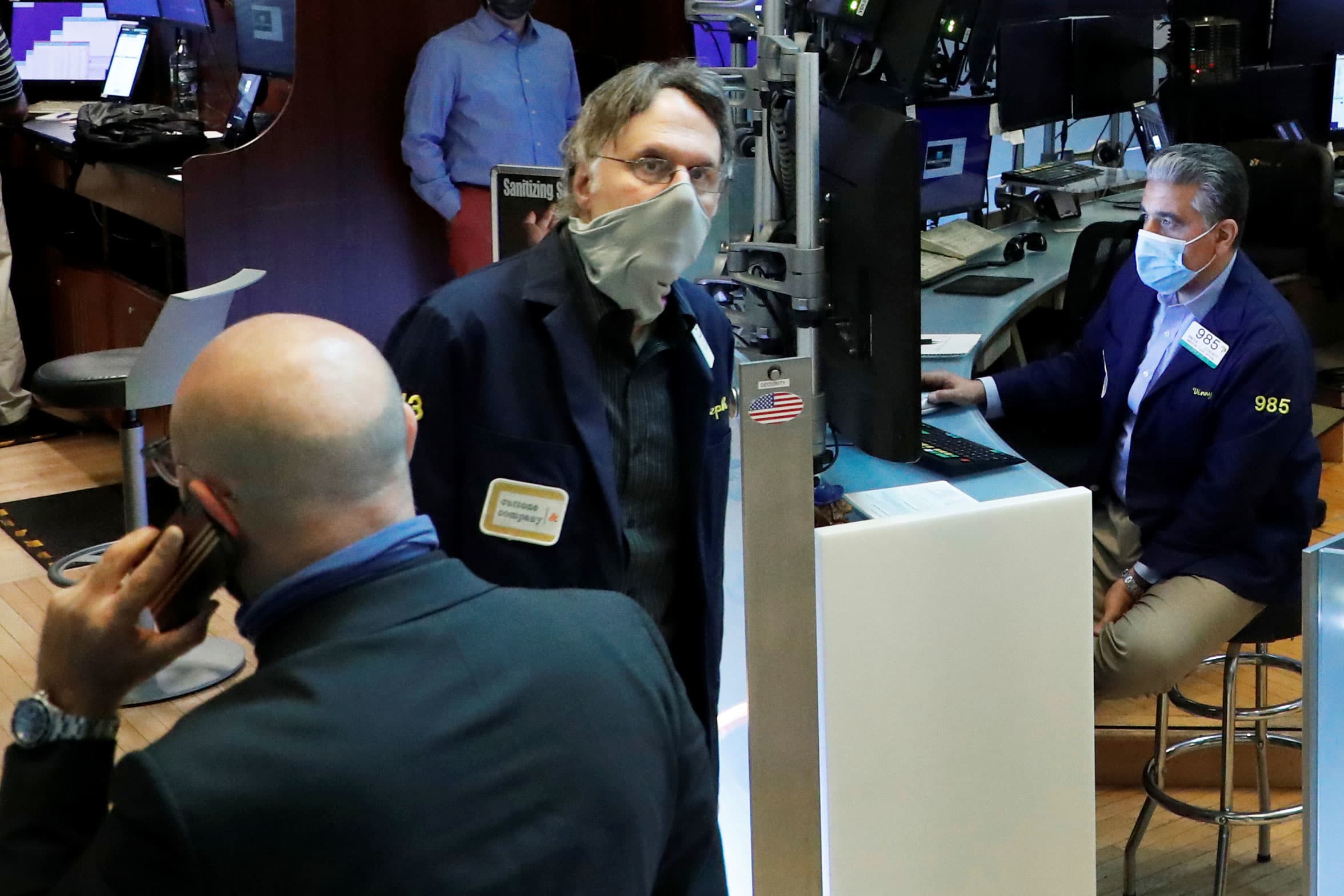Traders wear masks as they work on the floor of the New York Stock Exchange as the outbreak of the coronavirus disease (COVID-19) continues New York, May 27, 2020.
Lucas Jackson | Reuters
The stock market is selling off hard on rising virus cases and election uncertainty, and it faces another big test Thursday when Big Tech favorites report earnings.
“I think it may be we’re beginning to see a sea change about tech valuations,” said Peter Boockvar, chief investment strategist at Bleakley Advisory Group. He noted that Microsoft’s earnings were better-than-expected Tuesday, yet its just inline guidance did not stop its stock from declining about 4% Wednesday in the market sell-off.
Apple, Alphabet, Amazon and Facebook, which have led the market’s gains, report earnings after Thursday’s closing bell. Twitter also reports Thursday afternoon. The group has a lot of sway over the market. Apple, for instance, with its $1.9 trillion market cap, is included in the Dow, S&P 500 and Nasdaq.
Boockvar said he’s beginning to see signs of a change in attitude about the group of large tech and social media names. “I’m seeing signs of it, but we’ll have to see how the market responds when these very expensive stocks report. The bar is high. We know that, but even if you exceed that bar, it seems valuations are beginning to matter.”
The Dow was down more than 800 points, or 3% Wednesday afternoon, as virus cases surge in the U.S., and France and Germany plan for partial lockdowns to stop the spread there. The looming U.S. presidential election is another source of angst, as investors worry there may be no clear outcome Tuesday night.
“If the market can’t react positively to Facebook, Amazon, Google and Apple, what’s it going to react positively to? Plus people probably won’t have much conviction even if the reports are good. They still want to see what happens in the following week [with the election],” said Scott Redler, partner with T3Live.com.
Microsoft’s sell-off was clearly a warning for tech.
“As soon as Microsoft got sold on strong news yesterday, some of the FOMO [fear of missing out] left these stocks…That’s when you started to see sellers come back to big cap tech,” Redler said. If the market goes low enough Thursday and the tech earnings are strong after the bell, that could be the set up for an oversold bounce.
The Nasdaq was off 3%, shedding more than 335 points. The S&P 500 was off just about 100 points, sliding under the key 3,300 level. Tech was among the worst hit of the major sectors, down 3.4%. Communications services fell 3.5%. That sector includes Facebook and Alphabet.
“This is just a perfect negative storm right now,” said Julian Emanuel, head of equity and derivatives strategy at BTIG. He expects the sell-off to continue into the election, and after if there’s no winner.
“Price reaction to almost all of FANG reporting after the bell Thursday could make this more extreme,” he said. FANG stocks include Facebook, Amazon, Netflix and Alphabet, but the group of high-fliers has also come to include Microsoft and Apple.
“Downside momentum seems to be building here. People just want out,” said Chris Rupkey, chief financial economist at MUFG Union Bank. Rupkey points out that the sell-off is happening as Big Tech CEOs like Twitter’s Jack Dorsey testify before Congress but traders did not tie the decline in Nasdaq to that hearing.
“It’s the increases in virus, and its some of the tech leaders have fallen off. We never really regained back to September, and those September highs were all made on tech,” Rupkey said.
Emanuel said the selling could have a ways to go. For the time being, we think the pressure will remain on the market with an eventual retest of the 200-day moving average, either before or after the vote,” he said. The 200-day on the S&P 500 is just about 3,130.
The 200-day moving average is based on an average of the last 200 closing values, and it is often seen as a sign of support.
Redler said if the S&P 500 can’t recover its 100-day moving average at 3,300, it will likely test the 200-day, which is also the same level as the June lows.
“It’s all of these things coming together. It is basically the new certainty that the virus is accelerating sharply and the certainty that we’re not going to get any stimulus before the election,” said Emanuel.
Some strategists expect a blue wave, with a Democratic sweep of Congress and White House, but the election is difficult to call with early voting already in high numbers.
“If we saw an election outcome that very few people are thinking about, the Democrats winning the Senate and House, and President Trump winning the White House, you’re going to have a massive rally,” said Emanuel. That combination would suggest a very large stimulus program, since it is the Senate Republicans who would not agree to a large spending package.
